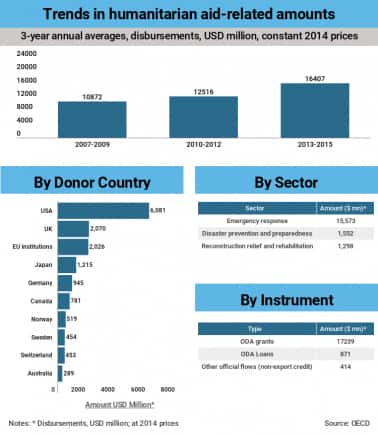



RN Bhaskar
There are several ways of looking at humanitarian aid. Each of these viewpoints has a grain of truth in it. These came into sharp focus after the Union government refused to let the United Arab Emirates (UAE) donate Rs 700 crore as relief aid to the flood-disaster struck state of Kerala.
Consider the following talking points:
One, humanitarian action saves lives. It alleviates suffering. It also helps maintain human dignity following conflict, shocks and natural disasters.

Data from the Organisation for Economic Cooperation and Development (OECD), a club of rich nations, show that donations from its members are increasing. Between 2013 and 2015, the members collectively contributed around $16.7 billion annually as humanitarian aid. Such numbers reaffirm the belief that aid is needed for providing relief at times of distress.
Two, people often focus on problems like violence, terrorism, and instability. In reality, natural disasters are far more destructive. For instance, as Vox points out, between 1980 and 2000, earthquakes, tsunamis, and floods killed around 1.5 million people. They affected 2.3 billion people worldwide. Economic losses from these catastrophes average between $250 billion and $300 billion per year, a number that's expected to increase in the future. Moreover, the impact falls disproportionately on poor countries. The number of people killed in these disasters was higher than those who lost their lives in wars or terrorist attacks. Yet governments, including India’s, are liberal in giving grants to victims of such attacks.
Three, the amount of aid a country, or a disaster-struck region, receives is proportionate to the amount of media attention it gets. This can be unfair to countries that do not have a voice or a location recall for the rest of the people in the world. The discrepancy is even greater for smaller disasters, which, when added up, account for majority of deaths and displacement but don't make headlines, and hence receive even less attention from donors.
Four, foreign aid, if unregulated, leads to a variety of problems as well. Potential recipients become choosy about which donor to embrace, and which items to accept. That is not good for either the dignity or the concept of aid.
Five, over the years, countries have begun to realise that direct aid can be counter-productive to national self-esteem and objectives. It is sometimes better to refuse aid, or channel aid to a government body, which then decides how to spend it.
These are the issues that are being talked about ever since the Kerala floods battered the state, and offers for aid began pouring in. The inability of the government to come up immediately with a decent rescue package for rehabilitation made such offers even more attractive. As Kerala Chief Minister Pinarayi Vijayan pointed out, UAE is not just another country. Most of the workers in that territory are from Kerala. It is like a second home for many Keralites. Surely, this could be seen as a family helping out its kin?
The problem lies with a decision that India took in 2004 after a tsunami laid waste to southern and eastern parts of the country: India would not accept aid anymore; it was capable of managing on its own. Indeed, India had accepted foreign aid and relief earlier. It had accepted foreign aid during the Uttarkashi earthquake in 1991, Latur quake in 1993, Gujarat earthquake of 2001, Bengal cyclone in 2002 and also during the Bihar floods of 2004.
So what should the government do this time?
If it does not formulate a policy soon, private individuals will intercede on behalf of Kerala, take the money, and send it from UAE as private remittances. As these individuals are non-resident Indians, they cannot be subjected to tax either. But then, that will lead to undesirable consequences of creating new channels for funds flow into India.
As of now, the government has yet to take a stand on how these funds should be channeled. It is quite possible that some of the money will come into India – one way or the other. The government cannot do anything about it. It may be worth remembering that earlier this year, legislators modified the Foreign Contributions Regulations Act permitting political parties to receive funds from overseas without disclosing the source. This very law could be used to defeat the government’s ban on foreign aid. That unwise amendment could haunt the government in the days to come.
It is time that legislators sat down and prepared laws that are good for the country — both ethically and financially.
The author is consulting editor with Moneycontrol.com
Discover the latest Business News, Sensex, and Nifty updates. Obtain Personal Finance insights, tax queries, and expert opinions on Moneycontrol or download the Moneycontrol App to stay updated!
Find the best of Al News in one place, specially curated for you every weekend.
Stay on top of the latest tech trends and biggest startup news.